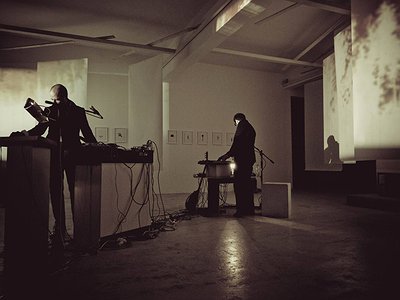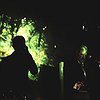The relationship between music and other forms of art – painting, video art and cinema most importantly - has become increasingly important. How do you see this relationship yourself and in how far, do you feel, does music relate to other senses than hearing alone?
There are so many uninspired directors hiring indie bands to make soundtracks, or uninspired bands having gratuitous video projected behind them live. That doesn't indicate an 'increase in the importance of a relationship between music and other forms of art'.
Music is but one small part of art. Arguably, the most disposable of disciplines. One has to only dig into the not-so-distant history of performance to see the relationship that creatively co-exists between all these disciplines. And all these disciplines relate to all senses regardless. When watching a silent experimental film, it's not that there is no soundtrack for your aural senses to react to, it's that that IS the soundtrack. Who listens to music without their imagination going all over the place?
There seem to be two fundamental tendencies in music today: On the one hand, a move towards complete virtualisation, where tracks and albums are merely released as digital files. And, on the other, an even closer union between music, artwork, packaging and physical presentation. Where do you stand between these poles?
Oh my, what a complicated question. My feeling is that it all goes back to the creator and how they feel they want their work represented. I hate purism with all my heart. So, for some people to say that albums are a thing of the past and artists today can't coherently put together a conceptual album tying in songs to artwork etc. blah blah - it's just silly.
If I conceive of a song as simply a song, or a 'single', then so what? How is that less coherent than a band making a concept album? We’re comparing apples to oranges. Now, at the risk of sounding like a hypocrite, I of course have a real fondness for conceptualised albums. In fact, the record we made is a concept album. Any of those pieces on their own are so weak in my opinion, but it’s their union along with the artwork that makes the damn thing an oeuvre. We actually spent so much more time on the artwork than we did on the music… by a long shot. I guess it’s all about intent.
The role of an artist is always subject to change. What's your view on the (e.g. political/social/creative) tasks of artists today and how do you try to meet these goals in your work?
I wouldn't use the word 'task' as I have a hard time with such concepts. Saying that an artist has a task points to a duty, in that an expectation exists. I think beyond those terms completely, in that I can only represent myself and my ideas, and what I deem as important politically and creatively. As cliché as it sounds, art is politics, and not in that blatant way of needing an anarchy symbol on your record or a pink triangle. So much can be said in so many ways.
I for one cannot separate the politics from the project. It’s in me, in my blood and in my culture. I try my hardest to keep it in check, to prevent myself sounding dogmatic or redundant or uninteresting. It’s such an accomplishment to me when I succeed in doing just that.
Music-sharing sites and -blogs as well as a flood of releases in general are presenting both listeners and artists with challenging questions. What's your view on the value of music today? In what way does the abundance of music change our perception of it?
It’s really an issue that I spend no time thinking or worrying about. I believe in natural filters that exist in life that weed out uninteresting art from interesting art. It could be uninteresting but popular, but that for myself, is far from a problem. As a consumer of art, I cannot and will not gravitate towards something that is 'bad' because of my natural filters that I don't even think about. I am also, like most of my peers, someone who gets a great deal of pleasure in hunting for interesting work, be it in cinema, music, visual art, dance, theatre, whatever. Abundance isn't a problem in my opinion.
How, would you say, could non-mainstream forms of music reach wider audiences?
They can't and they wont. The second it has reached a mainstream audience, well, it becomes mainstream. Not that that is a mark of quality mind you.
Usually, it is considered that it is the job of the artist to win over an audience. But listening is also an active, rather than just a passive process. How do you see the role of the listener in the musical communication process?
Again, using a term like 'job' is difficult for me to wrap my head around. I don't have a job within the confines of JIMH. We do what we do, knowing that we are presenting something that can challenge an audience and be an outlet of expression via some light and some sound.
Listening is of course an active process, and to categorise roles for an audience or a job for an artist is ridiculous. I don't feel like it’s a question that I need to answer in a performance. People get out of it what they will. Personally, I love not understanding, I really do. Which is why so much abstract art interesting to me.
Reaching audiences usually involves reaching out to the press and possibly working with a PR company. What's your perspective on the promo system? In which way do music journalism and PR companies change the way music is perceived by the public?
It’s a tricky thing because I don't think I even understand that whole system. I can't stand the idea that that is what makes something relevant or not. I realise it's important to make things visible to the grand public, but at the same time, it’s so tacky. Its odd how music has none of the oddball promoter antics that boxing has. We need a Don King of music.
Please recommend two artists to our readers, which you feel deserve their attention.
To read and hear more JIMH, visit jerusaleminmyheart.com



